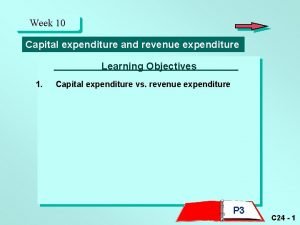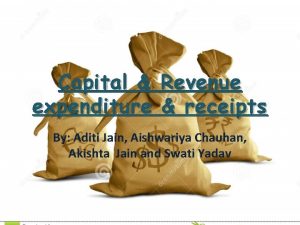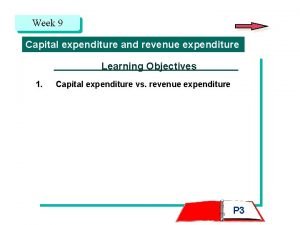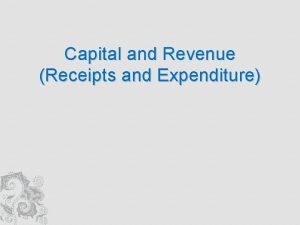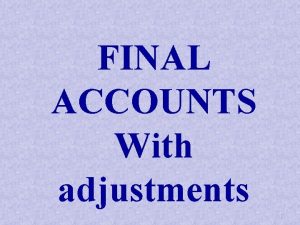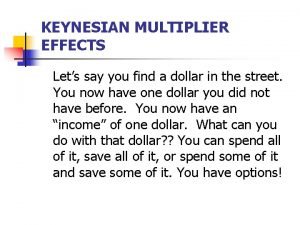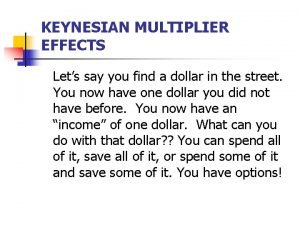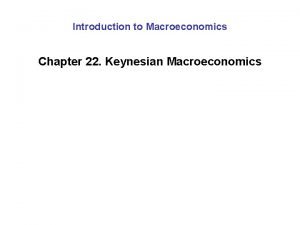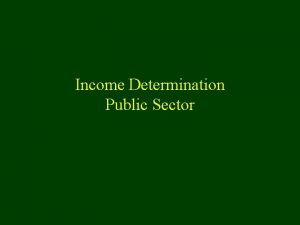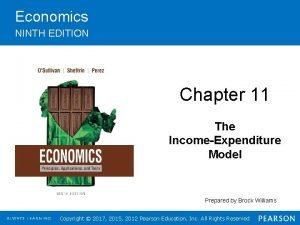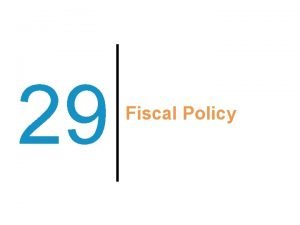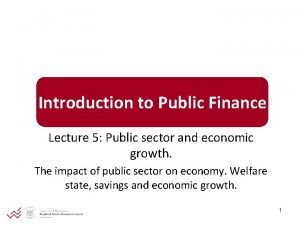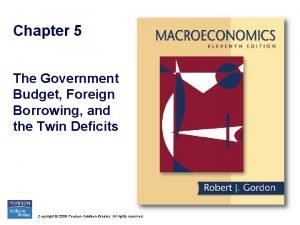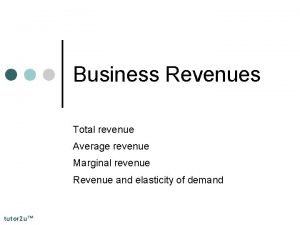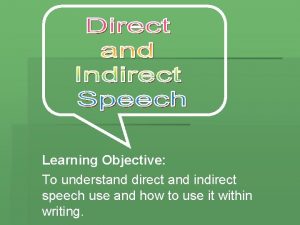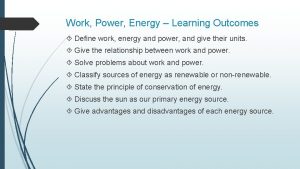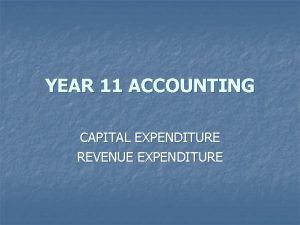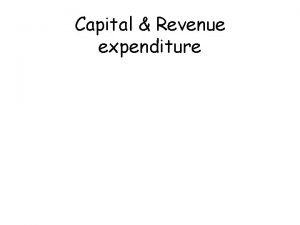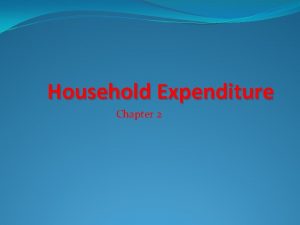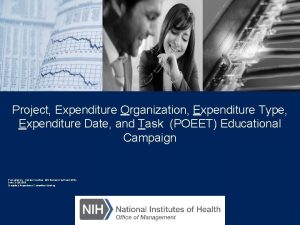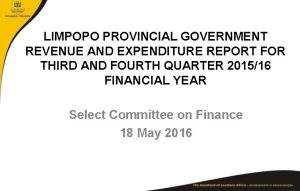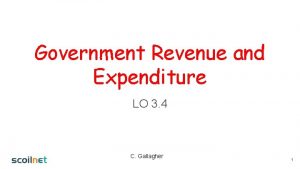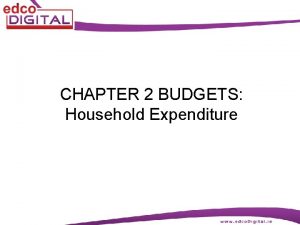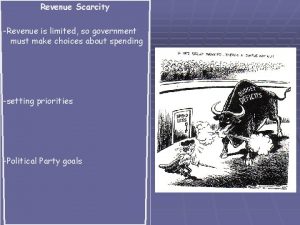Chapter 37 Government Revenue and Expenditure Learning Outcomes




















- Slides: 20


Chapter 37

Government Revenue and Expenditure

Learning Outcomes Upon completion of this chapter you should be able to: • Explain the need for a national budget • Identify sources of government revenue and items of government expenditure • Distinguish between balanced, surplus and deficit budgets • Outline the impact of budget decisions on Irish society.

The National Budget • The role of the government is to run the country. • Providing public services is an important part of this task. • The government will need to make use of available resources to provide the best possible level of public services. • Since the government doesn’t have enough resources to meet all demands for public services, it will need to prioritise some services over others.

Government Revenue • Government revenue refers to all money received by the government. • Government revenue can be divided into two distinct categories: o Current revenue: money received by the government on a regular or day-to-day basis o Capital revenue: money received on an irregular or once-off basis

Sources of Government Current Revenue • • • • Income tax Universal Social Charge (USC) Pay Related Social Insurance (PRSI) Value added tax (VAT) Corporation tax Excise duty Customs duties Local property tax (LPT) Capital gains tax (CGT) Capital acquisitions tax (CAT) Central Bank surplus income Dividends from State companies Stamp duty

Sources of Government Capital Revenue • Sale of State-owned companies (privatisation) • Borrowings from other governments or from financial institutions • European Union (EU) grants

Government Expenditure • Government expenditure refers to all money spent by the government. • Government expenditure can be divided into two categories: o Current expenditure: money spent by the government on a regular or ongoing basis o Capital expenditure: spending on ‘once-off ’ projects or on infrastructure that will have long-term benefits for the country

Government Current Expenditure • • Social protection Healthcare Education Justice Agriculture Defence Transport and tourism

Government Capital Expenditure • Public transport: building new rail networks, buying new trains and buses • Health: building new hospitals, buying new equipment and ambulances • Education: building or extending schools, buying furniture and ICT equipment for schools

Preparing the National Budget • The national budget is the government’s financial plan for the year ahead. • The Department of Finance and the Department of Public Expenditure and Reform work together to ensure that the government has enough money to run the country. • The Department of Public Expenditure and Reform assesses each department’s request for money and sanctions all government spending. • The Department of Finance authorises all taxes and government borrowing. • The Minister for Finance outlines the government’s financial plan for the coming year when the national budget is announced in the Da il. • The national budget sets out all the income that the government expects to receive and details the government’s spending plans.

Balanced Budget • If the government expects that planned revenue will be equal to planned expenditure it will be a balanced budget. • In this situation the government is taking money out of the economy through taxation but is returning the same amount of money to the economy via spending on public services. • A balanced budget is also called a neutral budget.

Balanced Budget

Budget Surplus • If revenue is expected to be greater than planned expenditure, the government will have a budget surplus. • This means that the government is taking more money out of the economy through taxation than it is spending. • This will reduce the overall level of money and spending in the economy • Since a budget surplus has the effect of making the economy smaller it is said to be a contractionary budget. • The government may choose this approach if it wants to reduce inflation or it is concerned that the economy is growing too quickly.

Budget Surplus

Budget Deficit • If planned revenue is less than planned expenditure, the government will be facing a budget deficit. • This means that the government is living beyond its means and will have to increase taxes, cut spending or borrow money to finance its plans. • A budget deficit is usually seen as a negative outcome and often occurs because the government has failed to meet its income targets or because public expenditure is out of control. • A deliberate decision to inject more money into the economy than is being collected through tax is known as an expansionary budget. • The government may use this approach if it wants to increase the level of economic growth.

Budget Surplus

Solutions to a Budget Deficit There are three possible ways of reducing or eliminating a budget deficit. Governments tend to use a combination of all three: • Increase planned revenue: by raising taxation levels or selling state assets. • Reduce planned expenditure: by cutting the level of public services. • Borrow money: to bridge the gap between revenue and expenditure. This is a shortterm solution since paying interest and repaying borrowings will impact on future budgets.

Recap and Review Can you do the following? • Explain the need for a national budget • Identify sources of government revenue and items of government expenditure • Distinguish between balanced, surplus and deficit budgets • Outline the impact of budget decisions on Irish society.
 Capital expenditure and revenue expenditure
Capital expenditure and revenue expenditure Capital expenditure and revenue expenditure examples
Capital expenditure and revenue expenditure examples Capital expenditure and revenue expenditure
Capital expenditure and revenue expenditure Features of capital receipts
Features of capital receipts Capital and revenue expenditure
Capital and revenue expenditure Adjustments in final accounts
Adjustments in final accounts Government expenditure multiplier formula
Government expenditure multiplier formula How to find tax multiplier
How to find tax multiplier Gov spending multiplier
Gov spending multiplier Lump sum tax
Lump sum tax Tax multiplier equation
Tax multiplier equation Guillermo vuletin
Guillermo vuletin What is government expenditure multiplier
What is government expenditure multiplier Government expenditure
Government expenditure Government expenditure
Government expenditure Marginal revenue
Marginal revenue Government can sometimes improve market outcomes
Government can sometimes improve market outcomes Planning goals and learning outcomes
Planning goals and learning outcomes Learning objectives for direct and indirect speech
Learning objectives for direct and indirect speech Output devices purpose
Output devices purpose Sound energy definition
Sound energy definition
